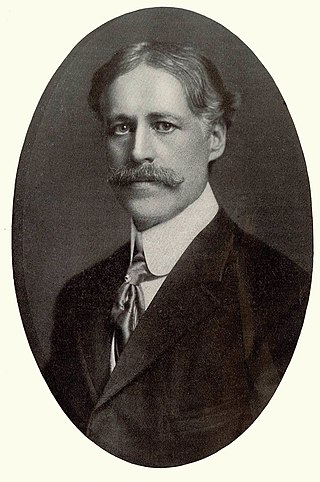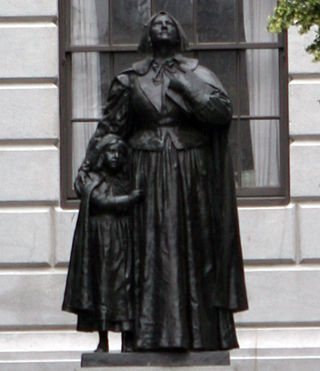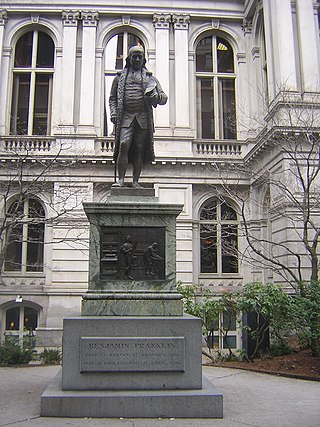
Thomas Ball was an American sculptor and musician. His work has had a marked influence on monumental art in the United States, especially in New England.

William Ordway Partridge was an American sculptor, teacher and author. Among his best-known works are the Shakespeare Monument in Chicago, the equestrian statue of General Grant in Brooklyn, the Pietà at St. Patrick's Cathedral in Manhattan, and the Pocahontas statue in Jamestown, Virginia.

A 1926–27 statue of George Washington by Italian American artist Pompeo Coppini was installed in northeast Portland, Oregon, United States. The bronze sculpture was the second of three statues of Washington by the artist, following a similar statue installed in Mexico City in 1912 and preceding another installed on the University of Texas at Austin campus in February 1955. The Portland statue was created to commemorate the 1926 sesquicentennial of the Declaration of Independence and dedicated in 1927. It was part of the City of Portland and Multnomah County Public Art Collection courtesy of the Regional Arts & Culture Council. In June 2020, it was toppled by protestors.

Thomas Jefferson is a 1911 bronze statue of a seated Thomas Jefferson created by Karl Bitter for the Cuyahoga County Courthouse in Cleveland, Ohio, United States.

A statue of Alexander Hamilton by William Rimmer is installed along Commonwealth Avenue, between Arlington and Berkeley Streets, in Boston, Massachusetts, United States.

A statue of Thomas Cass by Richard E. Brooks, called Colonel Thomas Cass, is installed in Boston's Public Garden, in the U.S. state of Massachusetts.

A statue of Daniel Webster by Hiram Powers is installed outside the Massachusetts State House, in Boston, Massachusetts, United States.

A statue of Tadeusz Kościuszko by Theo Alice Ruggles Kitson is installed in Boston's Public Garden, in the U.S. state of Massachusetts.

A statue of Anne Hutchinson by Cyrus Edwin Dallin is installed outside the Massachusetts State House, in Boston, Massachusetts, United States.

An equestrian statue of Paul Revere by Cyrus Edwin Dallin is installed at Paul Revere Mall near the Old North Church in Boston, Massachusetts.

A statue of Charles Devens by Olin Levi Warner, sometimes called General Charles Devens, is installed along the Charles River Esplanade, in Boston, Massachusetts, United States.

Triton Babies Fountain is a fountain and sculpture by Anna Coleman Ladd, installed in Boston's Public Garden, in the U.S. state of Massachusetts. It features a bronze sculpture, cast in 1922, that depicts a boy and girl and measures approximately 2 ft. 3 in. x 19 in. x 39 in. The statue rests on a granite base measuring approximately 2 ft. 6 in. x 18 in. x 31 in. The work was surveyed as part of the Smithsonian Institution's "Save Outdoor Sculpture!" program in 1993.

A statue of Benjamin Franklin by Richard Saltonstall Greenough is installed outside Old City Hall in Boston, Massachusetts, United States. It rests on a base with plaques designed by Greenough and Thomas Ball.

A statue of William Lloyd Garrison by Olin Levi Warner is installed along Commonwealth Avenue, in Boston, Massachusetts, United States. It was designed in 1885, cast in 1886, installed on May 13 of that year. The bronze sculpture measures approximately 7 ft. x 4 ft. x 6 ft. 4 in., and rests on a Quincy granite pedestal designed by architect Joseph Morrill Wells that measures approximately 4 ft. 9 in. x 4 ft. x 6 ft. 4 in. The memorial was surveyed as part of the Smithsonian Institution's "Save Outdoor Sculpture!" program in 1993.

A statue of John Glover by Martin Milmore is installed along Boston's Commonwealth Avenue Mall, in the U.S. state of Massachusetts.

A statue of Josiah Quincy III by Thomas Ball is installed outside Boston's Old City Hall, in the U.S. state of Massachusetts. The sculpture belongs to the City of Boston.

A statue of politician, diplomat, and orator Edward Everett by William Wetmore Story is installed in Boston's Richardson Park, in the U.S. state of Massachusetts.

A statue of John Winthrop by Richard Saltonstall Greenough is installed outside Boston's First Church, in the U.S. state of Massachusetts.

A statue of American Revolutionary War hero William Prescott by William Wetmore Story is installed next to the Bunker Hill Monument in Charlestown, Boston, Massachusetts, United States.

George Washington is an outdoor equestrian statue by the Scottish-American sculptor J. Massey Rhind located in Washington Park in Newark, New Jersey. It depicts General George Washington saying farewell to the troops of the Continental Army on November 2, 1783, and was dedicated on the anniversary of that event in 1912.




















